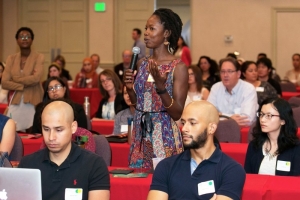Shape Narratives, Advance Social Justice
April 13, 2015 / by Matthew KredellGraduate students at the USC School of Social Work and the USC Price School of Public Policy organized the Students of Color and Allies Policy Forum to engage in collaborative and constructive discussions on race and social justice.
The forum held on April 3 originated last year as a way for graduate students to establish a safe environment to examine issues of race, class and inequality. For this second installment, titled “Communicating for Change: Building Narratives to Advance Social Justice,” the conversation was opened up for undergraduate students and community members to participate.
“By rerooting policy in the community, by acknowledging the leadership and expertise of community leaders, by recognizing our own privilege, and by recognizing pervasive racial and socioeconomic inequities, we begin to break down the barriers between policy experts and the public they should serve,” forum co-chair and USC Price Master of Public Policy student Christopher Lo-Records said to open the event. “That starts with communication, with dialogue and with the amplification of community voices to highlight problems and propose solutions.”
Critical conversations
Held at the Radisson Hotel across from the University Park Campus, the event included a keynote speech from NPR’s Code Switch Project reporter Karen Grigsby Bates, a panel discussion on “Critical Race Conversations” moderated by USC Price Associate Professor Lisa Schweitzer and four workshops designed to supplement their educational experiences.
“One of our focuses is illuminating societal issues through good storytelling,” Bates said. “For you all as policymakers, I think that’s an important part of how you are going to be doing your job.”
The panel discussion featured Clinical Professor Rafael Angulo from the USC School of Social Work, Professor Jody Armour from the USC Gould School of Law, UCLA Professor Emeritus Jerome Rabow and George Villanueva, a postdoctoral scholar at the USC Annenberg School for Communication and Journalism.
Armour noted that he wrote a book in 1997 titled Negrophobia and Reasonable Racism, and he’s been asked to speak about it at the upcoming Los Angeles Times Festival of Books at USC because so little has changed in race relations over nearly two decades.
“It’s like I wrote it yesterday,” Armour said. “Critical race theory is about how do we get at the underpinnings that make this problem so intractable. Why have we made so little progress, and what are the deeper analyses that can get us out of this rut?
In-depth stories needed
Panelists agreed that storytelling and narrative were critical when it came to issues of race and that traditional mass media can’t be counted on to tell those stories.
“We as social workers need to find ways of being able to use media platforms to further enhance those stories on a much deeper level,” Angulo said.
Social media has had a tremendous impact on allowing members of the communities from which there is trauma to get their stories out there.
“I saw the national attention that Ferguson got, coming out of those Twitter retweets,” Armour said. “It trended and then the mainstream media had to follow because it trended and it trended and it trended.”
Workshops for the forum focused on storytelling for impact, listening for change as a way to comprehend these stories, analytics for social change to use data and numbers in an effective manner, and community organizing for impact.
“Last year, we came together to begin conversations about race and social justice,” said forum co-chair and Price Master of Planning student Rosaline Tio. “This year, we considered what we could do not just to replicate what we did last year but to add to it. That’s why we tried to emphasize a theme of communication and how to communicate effectively when trying to discuss issues about race and inequality, and why we thought it was important to invite community members to take part in these conversations.”
To reference the work of our faculty online, we ask that you directly quote their work where possible and attribute it to "FACULTY NAME, a professor in the USC Suzanne Dworak-Peck School of Social Work” (LINK: https://dworakpeck.usc.edu)
